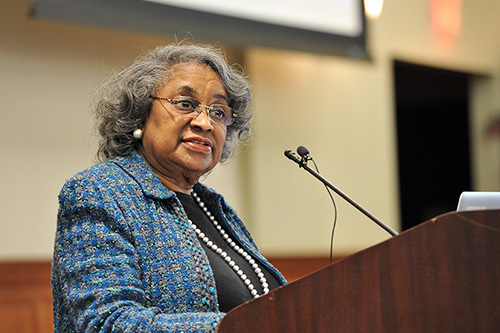Civil Rights icon addresses Rosa Parks luncheon
Civil Rights icon addresses Rosa Parks luncheon

Appearing before some 200 attendees of Rowan’s 9th Annual Rosa Parks Commemorative Luncheon Feb. 27, Civil Rights icon Juanita Jones Abernathy said historic progress in the battle for civil rights in the 1950s and 1960s would have been impossible without women like Parks.
Abernathy, whose husband, the late Rev. Ralph David Abernathy, was a close friend to Dr. Martin Luther King Jr., said women formed the backbone of the Movement and faced the same insults, degradation and violence by segregationists as the men.
Petite but engaging, Abernathy said not only did Parks, who is considered the Mother of the Civil Rights Movement, and other women like herself stand up to the same hatred as the men, they did it while raising children.
“Had it not been for the women, there would not have been a Civil Rights Movement,” Abernathy said.
Abernathy, who as a young woman took part in virtually every seminal event associated with the Movement, said despite great strides made on behalf of all Americans, racism persists in America and she called upon the nation’s youth to oppose it.
Though modern day racism is less obvious than it was during the early and middle 20th Century, when African Americans in many parts of the U.S. could not eat at the same lunch counters, drink from the same fountains, even use the same restrooms as white people, Abernathy warned that “it is alive and well all over America” today.
As an example she noted how some Americans disrespect and characterize President Obama.
“I’m proud to say to you that we’re not finished,” Abernathy said, gazing about the room at University students. “…You have the ability to change this country.”
Recalling the volatile era in which she came of age, she said African Americans were pushed so hard and for so long they had no choice but to react, and that they did so lawfully and with dignity.
She noted that Parks, whose image graced both sides of a wall behind the speaker’s podium in the Eynon Ballroom where she spoke, was the third but best known black woman to refuse to give up her seat to a white person in the segregated South. In fact, she said, just riding the buses in Montgomery, Ala., which was ground zero for the Movement, was degrading to African Americans.
“You paid your money in the front and then walked to the back door to board,” Abernathy said.
She said blacks who dared to resist segregation, including her family, Martin Jr. and Coretta Scott King, Parks and many others, faced daily bomb threats, constant harassment, and the realization that they and their children might be killed simply for wanting to live.
“You can take and take and take but there comes a time when you are filled up,” she said.
Following Parks’ death in 2005 Rowan’s Africana Studies program established an annual commemorative scholarship luncheon and award to honor Parks’ legacy.
The Feb. 27 program featured an interpretive dance segment by Atomik Legacy, a troupe of Rowan students, musical selections and remarks from several speakers.
Welcoming Abernathy, Rowan Executive Vice President Carl “Tobey” Oxholm III said both Parks and Abernathy represent some of the greatest women in American history.
“We must never forget that prejudice, racism and sexism are not matters of history,” Oxholm said. “”They’re here with us today.”
Today, he added, racism is no less real, it’s just more subtle, and that makes it all the more difficult to face and defeat.